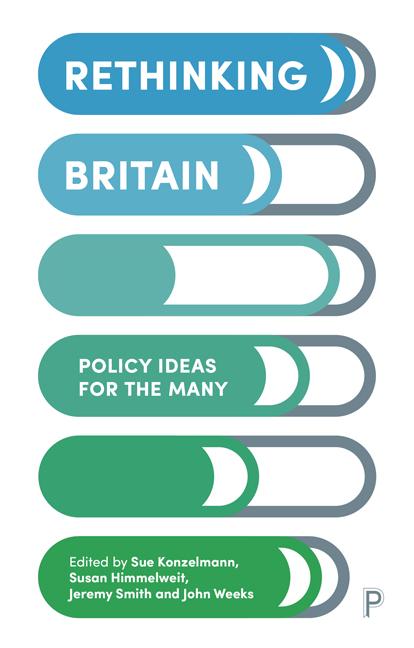Book contents
- Frontmatter
- Contents
- List of Tables and Figures
- The Contributors
- Foreword
- Introduction
- Interlude: ‘Mirror, Mirror, On the Wall – Who has the Highest Debt of All?’
- Part One Building a Full-Employment Economy: Introduction
- Part Two Public Investment – Prioritising Society Rather than Profit: Introduction
- Part Three Making Finance Work for Society: Introduction
- Part Four Genuine Social Security: Introduction
- Part Five How to provide for Social Needs: Introduction
- Conclusion
- Jargon Busters
- References and Further Reading
- Index
8 - How do we Build a Fairer Tax System?
Published online by Cambridge University Press: 11 March 2021
- Frontmatter
- Contents
- List of Tables and Figures
- The Contributors
- Foreword
- Introduction
- Interlude: ‘Mirror, Mirror, On the Wall – Who has the Highest Debt of All?’
- Part One Building a Full-Employment Economy: Introduction
- Part Two Public Investment – Prioritising Society Rather than Profit: Introduction
- Part Three Making Finance Work for Society: Introduction
- Part Four Genuine Social Security: Introduction
- Part Five How to provide for Social Needs: Introduction
- Conclusion
- Jargon Busters
- References and Further Reading
- Index
Summary
What's the issue?
Tax is an effective tool available to governments to implement their social and economic policies. The current institution for collecting taxes in Britain, Her Majesty's Revenue & Customs (HMRC), does not allow effective use of the tax instrument.
How should tax administration be administered to ensure accountability, transparency and effectiveness?
Analysis
HMRC is not directly accountable to the government. There is no minister with direct responsibility for taxation, nor is there a select committee on taxation in the House of Commons. These missing institutions leave tax administration without sufficient political oversight and with too narrow a mandate, flaws compounded by an invalid presumption that HMRC operates in an apolitical manner.
Under the present system HMRC is apolitical in form but not in practice. The Treasury manages the national budget in ways that, in effect, treat tax functions as a constraint on, rather than a facilitator of, social and economic policy. In addition, the absence of an Office for Tax Responsibility function is a serious shortcoming in Britain – such institutions are common in other developed countries. To make the tax system democratically accountable, Parliament should transform HMRC into a Ministry of Tax, allocating sufficient resources to ensure effective monitoring of tax collection and its social and economic impact.
What can we do?
To achieve a tax system that is adequate for implementing progressive policies, the following changes are required. First, the Cabinet needs a minister responsible for taxation. This minister's role would be different from that of the Chancellor of the Exchequer, whose principal function is overall economic management.
Second, because of the importance of taxation, the Ministry of Tax should operate in cooperation with, but independent of, the Treasury. The new Ministry would set tax policy to meet the economic objectives set by the Chancellor, who would have overall responsibility for economic policy. The new Ministry would be responsible for facilitating these policies in a transparent manner. The Ministry of Tax would have oversight of revenue collection. A clear division between the Treasury and the Ministry of Tax is essential in order that tax serves its supportive function, assisting the achievement of economic goals rather than functioning as a constraint on them.
- Type
- Chapter
- Information
- Rethinking BritainPolicy Ideas for the Many, pp. 46 - 48Publisher: Bristol University PressPrint publication year: 2019



